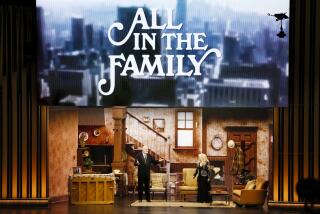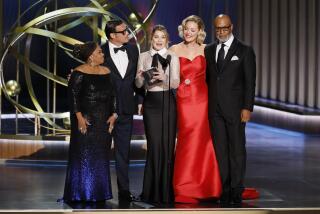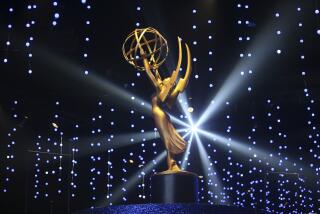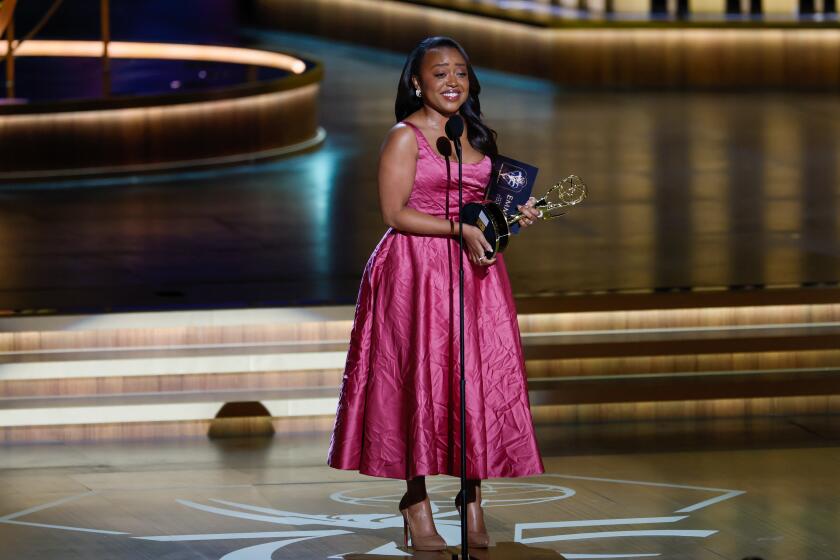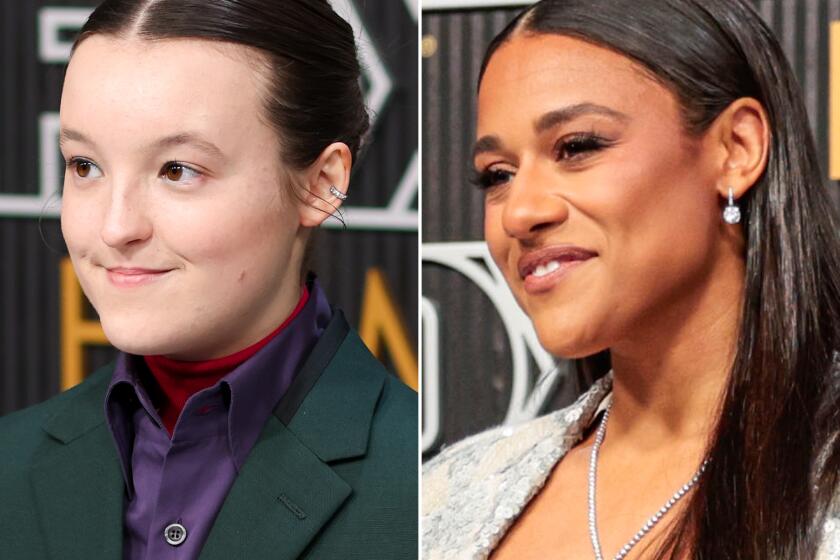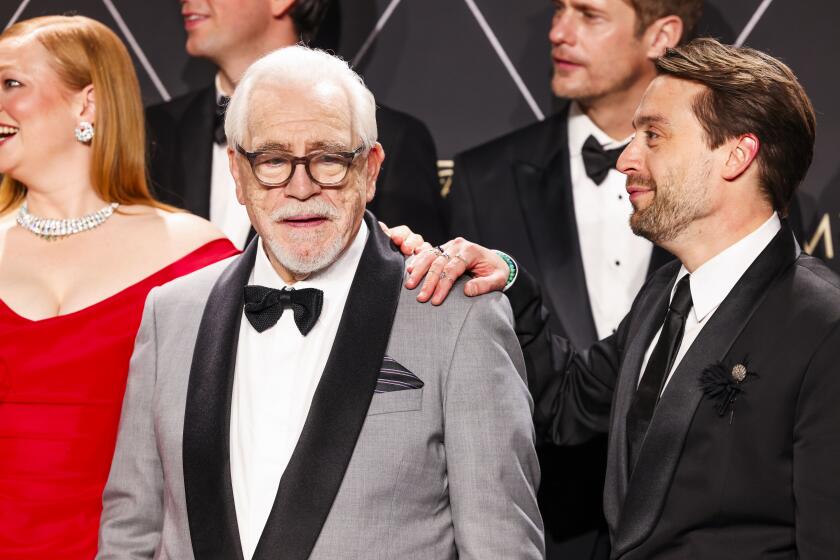Academy President Defends Emmy Show
For three days now, the 44th annual Emmy Awards show has been the subject of a national thrashing by the media for being too political and too long, with too many confusing categories that simply didn’t make sense.
“I just wish that the press would take a little more time learning what our particular problems are before they start blasting away at us,” responded Leo Chaloukian, president of the Academy of Television Arts & Sciences.
Nonetheless, it appears that there may be significant changes in store for the Emmys next year involving the simplification and elimination of certain categories, Chaloukian said.
The Emmy Awards show is at a critical juncture, with the academy engaged in negotiations for a new broadcast contract next year. Already the academy is scaling down its operations in anticipation of a smaller financial deal. On another front, the Emmys will face competition from the American Television Awards, which ABC plans to introduce next year as a more viewer-friendly alternative to the industry-backed show.
Sunday night’s broadcast received its best rating since the show moved to Fox in 1987, but it has been assailed not only by TV critics but also by some members of the TV industry.
“It’s the easiest thing in the world to be a Monday-morning quarterback,” Chaloukian said. “The critics can sit there and try to analyze what we do, and they do it within a 10-minute period. And committees of ours spend days and days, hours and hours, going over these things trying to figure out what’s best for the academy and the industry.
“Sometimes they’re right, sometimes they’re wrong. You learn by trial and error. Either way, we’re damned if we do, damned if we don’t.”
Chaloukian and the academy received some vindication Tuesday morning when the national ratings rolled in. Fox’s broadcast Sunday night showed a healthy increase in viewership for the second year in a row, with a 13.9 rating and 24% share of the viewing audience. That still trailed the numbers posted for the Daytime Emmys on CBS last June, but was a significant improvement from the show’s historic low of 8.2 two years ago.
One reason for the higher ratings, Chaloukian believes, was the academy’s decision to air the Emmys before Labor Day this year.
The ratings are especially good news at this time for the academy, because Fox’s three-year, $9-million deal to broadcast the Emmys ended this year. The academy is now talking to ABC, CBS, NBC and Fox to develop a “wheel” system in which each network will take turns airing the awards show.
Chaloukian denied the suggestion that the critical drubbing of Sunday night’s broadcast had tarnished the Emmys, but he did express concern that presenters and winners used the ceremony as a platform to take political potshots, particularly at Vice President Dan Quayle.
“The academy is a nonpolitical, nonprofit organization,” Chaloukian said. “I personally, and I speak personally, was very unhappy about what was going on (Sunday night). I don’t necessarily imply I don’t agree with what they were saying, but the academy’s Emmy show was not the place to do it.”
Chaloukian said that he could not control the political overtones of the Emmy ceremony any more than he could hope to control its length, which stretched 32 minutes beyond the scheduled three hours. At the end of the program, the six major awards that viewers wait all evening for were rushed through with no clips and little fanfare.
Chaloukian blamed the overrun on the evening’s earlier presenters and award recipients.
“Once people get up there for their acceptance speech, we can’t control them,” Chaloukian explained. “A great deal of the dialogue the hosts and comedians did was unscripted, ad libbed, off the cuff. How can you control it?
“That’s what happens. It’s an impossible situation. If they start talking too long or making political remarks, what are you going to do, cut to a commercial? Next thing you’ll have some reporter screaming censorship, free speech and the denial of First Amendment rights.”
One criticism that falls directly on the academy’s doorstep, however, arose when Christopher Lloyd won as best lead actor in a drama series for a one-time guest appearance on the Disney Channel’s “Avonlea,” beating out such series regulars as Sam Waterston of “I’ll Fly Away,” Rob Morrow of “Northern Exposure” and Scott Bakula of “Quantum Leap.”
Previously, guest stars were recognized in their own categories, which were announced the night before the major awards in a separate Emmy ceremony that is not televised. But Chaloukian said the academy bowed to pressure from a special-interest group--in this case, a small band of unhappy actors--who wanted to be included in the glamorous, prime-time awards ceremony.
* “We were trying to create a separate category for them in prime time,” Chaloukian said. “Unfortunately, certain individuals took it upon themselves to put pressure on, and what happened happened. The only way we could get them there this year was to put them with series actors. Hopefully in the future that will be changed.”
Chaloukian pointed out that all the academy judges and leaders, including himself, are volunteers who want to serve their industry (he earns his living as president of Ryder Sound Services in Hollywood). But pleasing everyone has become an impossible task, he said. Tuesday morning the Hollywood trade papers were full of quotes from unnamed TV executives criticizing Sunday night’s broadcast.
“The problem we have is every time a new format appears on television, we start getting pressure from the special-interest groups, wanting us to form a new category and award an Emmy,” he said. “We’re constantly faced with that. Constantly.”
Then when the academy adds new categories, the press complains that the Emmys have bulked up to become awkward and meaningless, he said.
Chaloukian said that he plans to push for changes in the format of the categories, but declined to be specific. Academy decisions regarding the Emmys start at the awards committee, made up of 40 members--with two representatives from each industry peer group. Their recommendations are then reviewed by the board of governors.
As for negotiations regarding a new TV contract, Chaloukian said that he does not expect to wrangle the roughly $3-million a year that the academy received from Fox over the last three years, when the fledgling network aggressively outbid the Big Three networks to help establish itself as a player.
He said that the academy already has made budget cuts, combined responsibilities of staff members and eliminated certain activities in anticipation of a lower price tag on the Emmy Awards, which pays for most of the academy’s operations.
“All the networks are receptive,” Chaloukian said. “It’s just a matter of coming to some sort of agreement to a license fee. The academy needs so many dollars to survive in order to continue with everything we do--the L.A.-area awards show, the daytime awards show, our internships, scholarships, student awards program, anti-substance abuse program, our magazine, the library and our archives.”
More to Read
The complete guide to home viewing
Get Screen Gab for everything about the TV shows and streaming movies everyone’s talking about.
You may occasionally receive promotional content from the Los Angeles Times.
